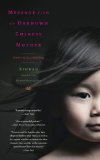Summary | Excerpt | Reviews | Beyond the Book | Readalikes | Genres & Themes | Author Bio

Critics' Opinion:
Readers' Opinion:
First Published:
Mar 2011, 272 pages
Paperback:
Mar 2012, 272 pages
 Book Reviewed by:
Book Reviewed by:
Julie Wan
Buy This Book
In this book, you will read tragic stories of what has traditionally happened to abandoned girl babies, and what continues to happen. The tools for enforcing these traditions have been forged from a need to survive, and honed by mothers over centuries - and yet the victims are themselves women and girls. In 2004, I set up a charity in the United Kingdom called the Mothers' Bridge of Love (MBL). It has three main aims: to provide cultural resources for Chinese children living all over the world; to help those children who had been adopted into Western families, and so had a dual cultural heritage; and, especially, to provide help for disabled children who languished forgotten in Chinese orphanages.
The names of people and places have all been changed in this book, in order to protect the privacy of the birth mothers. Their stories, however, are all true. They are about the message from those secret Chinese mothers to their unforgotten daughters - loved and lost …
Footnotes
*Number of Children adopted from China to USA (Only U.S. citizens numbered).
2009: 3,001
2008: 4,122
2007: 5,453
2006: 6,493
2005: 7,906
2004: 7,044
2003: 6,859
2002: 5,053
1992–2001: at least 30,000
(http://www.fwcc.org/;
http://www.adoptivefam.org/china_adoption.php;
http://international-adoption.suite101.com/article.cfm/an_overview_of_international_adoption_from_china;
http://adoption.state.gov/news/total_chart.html)
† I started being a radio presenter from Henan in 1989, then moved to Jiangsu Radio in Nanjing in 1992. Before 1988 the radio channel "Tong-zhan Pin-dao," for which I worked in Henan, was controlled by the central government for sending out a disturbing signal to stop people from listening to BBC and ABC in Asia … I couldn't point it out before 2003 as a part of national secrets. There were more than three thousand staff members at these two radio stations, it would be too difficult for Western readers to remember the names of those people and places. Therefore, I put my stories into one place, Nanjing, a city that I love and am proud of, full of history, culture, and food. Nanjing is the greenest city in China, with lots of trees, green fields, and lakes. It is very special to today's China, where the cities are all made up of buildings and roads.
* The economist Ma Yanchu (1882–1982) entered Beiyang University in Tianjin in 1901 to study mining and metallurgy. After earning a master's in economics at Yale University and a doctorate at Columbia University, he returned to China in 1915 and worked first in the Ministry of Finance of Yuan Shikai's republican "Beiyang government" and later as a professor of economics at Peking University. In August 1949, he became head of Zhejiang University and held a number of government positions. He began to focus his research on the problem of the rapid expansion of China's population growth in the early 1950s, publishing New Theory of Population. Ma stressed the need to accumulate capital; develop science and technology; improve labor productivity, standards of living, and educational levels; and increase supplies of industrial raw materials. Concluding that there was an urgent need to control population numbers, he made three main points: (1) Only if population numbers were controlled could consumption be brought down, allowing capital accumulation. (2) To build socialism, it was necessary to increase labor productivity, to develop heavy industry, and to electrify and mechanize agriculture. (3) There was a conflict between agriculture and industrial raw materials; population pressure on food resources meant that there was little land on which to cultivate cotton, silkworms, soya beans, peanuts, and other cash crops. "For food reasons alone, the population must be controlled," he wrote, and this should be done without delay. Ma raised the population problem with Mao Zedong on many occasions. Mao Zedong disagreed. "Can we plan the production of people? Can we subject them to studies and experiments?" A nationwide campaign was launched to criticize "Ma Yanchu's reactionary thinking." But Ma stood firm, and although he was by then getting on in years, he declared publicly, "For the sake of my country and the truth, I will continue to uphold my population theory, no matter what. I do not fear being attacked or isolated, nor do I fear hardship, dismissal, imprisonment, even death itself." On January 3, 1960, he was forced to resign from his position as head of Peking University, and soon afterward was relieved of his duties on the Standing Committee of the People's Congress. He was forbidden to publish, speak publicly, give interviews to reporters, or receive overseas visitors even if they were friends. For his misdeeds, he was also placed under house arrest. After the demise of the Gang of Four, Ma Yanchu was reappointed head of Peking University. He died shortly before his one hundredth birthday, on May 14, 1982.
Excerpted from Message from an Unknown Chinese Mother by Xue Xinran. Copyright © 2011 by Xue Xinran. Excerpted by permission of Scribner. All rights reserved. No part of this excerpt may be reproduced or reprinted without permission in writing from the publisher.





The Funeral Cryer by Wenyan Lu
Debut novelist Wenyan Lu brings us this witty yet profound story about one woman's midlife reawakening in contemporary rural China.
Your guide toexceptional books
BookBrowse seeks out and recommends the best in contemporary fiction and nonfiction—books that not only engage and entertain but also deepen our understanding of ourselves and the world around us.